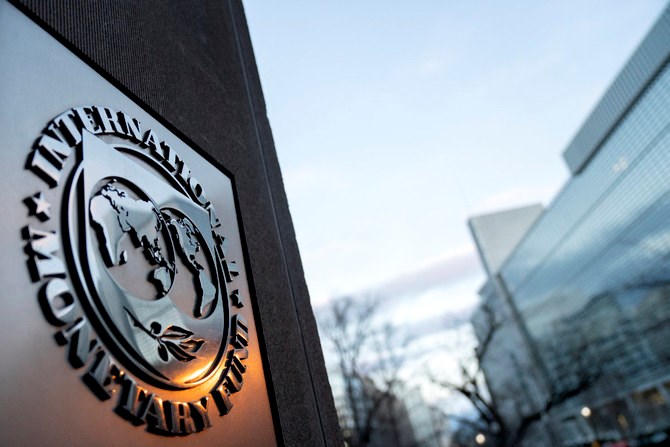IMF raises alarm on global food prices amid termination of grain deal
IMF warns that discontinuing the grain deal would impact the food supply of countries heavily reliant on Ukrainian shipments.
-

The seal for the International Monetary Fund is seen near the World Bank headquarters (R) in Washington, DC. (AFP)
The International Monetary Fund (IMF) issued a warning about the termination of the Black Sea grain deal, stating that it could worsen global food insecurity and lead to price surges, especially in less affluent nations.
The deal, brokered by the UN and involving Russia and Ukraine, allowed safe passage for Ukrainian agricultural exports via the Black Sea, but it was recently terminated.
The IMF spokesperson emphasized that discontinuing the deal would impact the food supply of countries heavily reliant on Ukrainian shipments, particularly in North Africa, the Middle East, and South Asia.
The absence of the deal could exacerbate food security issues and contribute to global food inflation, especially for low-income countries.
The terminated agreement played a significant role in supporting global food security by facilitating grain and fertilizer exports from Ukraine to the global market, thereby alleviating pressure on international food prices. The IMF assured that it would closely monitor the situation in the region and the potential consequences on global food security.
Moscow's decision to terminate the grain deal was announced on Monday due to other parties' failure to fulfill their commitments regarding Russia's agricultural exports. The original agreement included a Russia-UN memorandum to ease sanctions affecting Russian exports. However, demands like reconnecting Rosselkhozbank to the SWIFT interbank messaging system, enabling deliveries of agricultural machinery spare parts, and lifting insurance and logistics restrictions, have not been met.
Russia outlines seven conditions to resume grain deal
In response, Moscow stated that it would reinstate the arrangement once its conditions are met and expressed willingness to provide grain to low-income countries severely impacted by food insecurity, free of charge. Russia's Deputy Permanent Representative to the UN, Dmitry Polyansky, declared on Saturday that Russia is open to rejoining the grain deal facilitated by the UN and Turkey but under certain conditions. Polyansky emphasized that Russia's decision to withdraw from the deal, which aimed to unblock agricultural exports, was not unexpected since their concerns had remained unaddressed.
The top Russian diplomat underscored the significance of the grain deal for global food supplies and emphasized that Russia would only consider rejoining if all the previously agreed-upon principles of their participation were fully implemented without any exceptions.
The conditions laid out by Russia encompass the practical lifting of sanctions on their grain and fertilizer exports to global markets, as well as the removal of obstacles faced by Russian financial institutions in the sector, including restoring their connection to the SWIFT payment system.
Furthermore, Russia insists on an uninterrupted supply of spare parts and components for agricultural machinery, the resolution of issues related to vessel freight and insurance concerning Russian food exports, and the unhindered expansion of Russian fertilizer exports, which includes repairing the damaged Togliatti-Odessa ammonia pipeline.
In addition to these demands, Russia requires the release of all its assets associated with the agricultural sector. They also emphasize that the grain deal should prioritize its original humanitarian purpose, aimed at addressing food issues in developing countries rather than benefiting wealthy nations.
Read next: Black Sea grain shipments risky without security guarantees: Kremlin

 3 Min Read
3 Min Read









